New Chabad facility in Thai beach town opens its doors to throngs of Jewish travelers
Aish.com — February 2018
PHUKET, Thailand — It was a Thursday night last August when Rabbi Mendy Segal, the chief Jewish emissary, or shluchim, of this island off the southwestern coast of Thailand, received a phone call every rabbi dreads but must deal with on occasion.
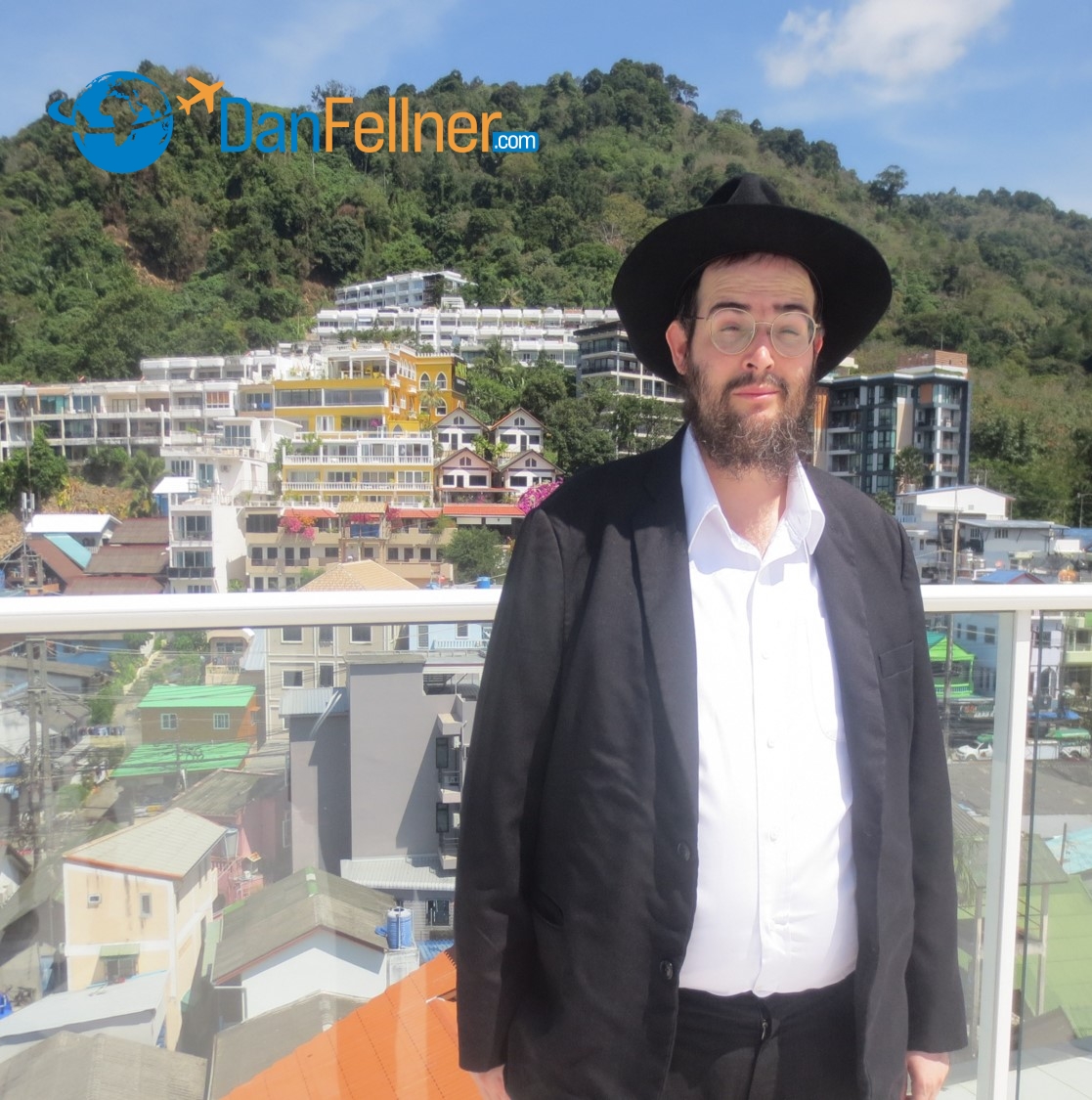
Rabbi Mendy Segal on the rooftop of the new Chabad Phuket House.
Two Israelis were in a Thai jail on drug charges and needed the rabbi’s help to bail them out.
The call came at the worst possible time. Chabad Phuket had a series of events planned that coming weekend in conjunction with the opening of a swanky new $4 million facility and people were coming from all over the world to celebrate. Rabbi Segal barely had a second to spare.
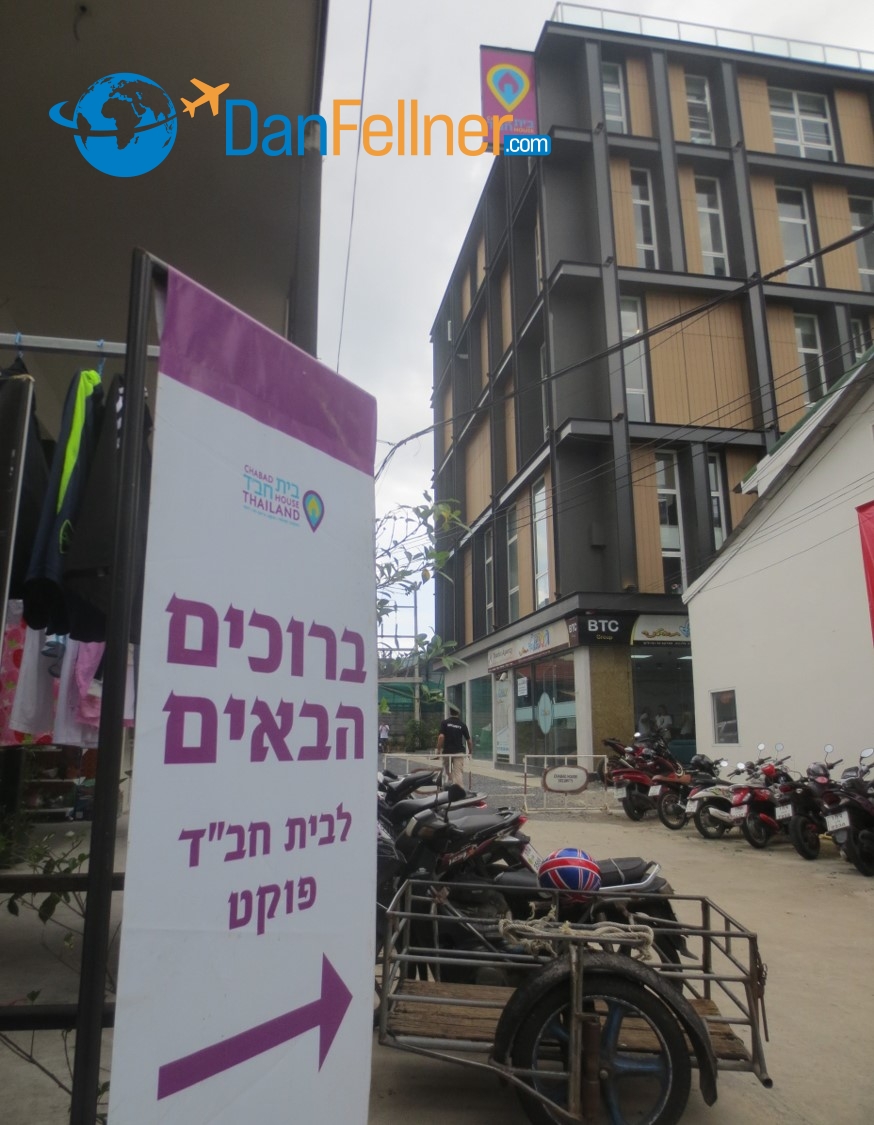
The new six-story Phuket Chabad House is located on a quiet side-street.
Still, he planned to go down to the police station the following morning to offer his assistance. When you’re the only rabbi in a popular tourist destination where there are so many Jewish visitors, it’s an unpleasant – but necessary — part of the job.
Then, he learned that the two men arrested were actually Arabs with Israeli passports.
Should he go, or should he stay and plan for busy weekend ahead? He sought counsel from the chief rabbi of Thailand in Bangkok, Rabbi Yosef Kantor.
“And he said, ‘Mendy, you go,’” recalls Rabbi Segal. “You have to be a mensch. God wants you to be there.”
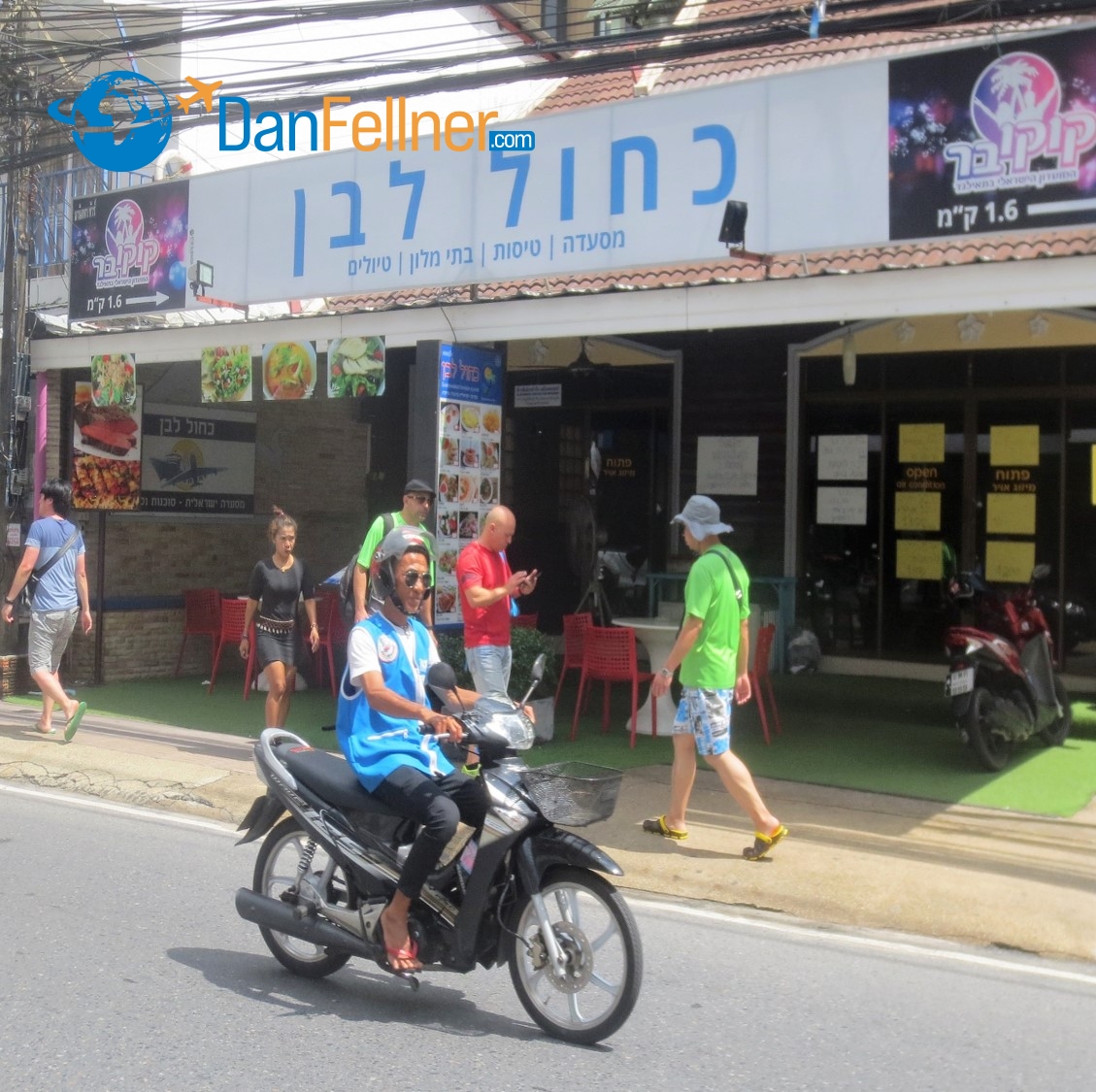
There are several Israeli-owned businesses near the Phuket Chabad House.
So Rabbi Segal went down to the jail Friday morning and helped get the two men released on bail. In the process, he met one of their friends, another Israeli named Vadim.
“I started to talk with him and learned his mother is Jewish. I was so happy. I found out the reason I came.”
Vadim, whose father was Arab, had never set foot in a synagogue before. He was afraid it would cause tension in the family back in Israel. But after some coaxing from Rabbi Segal, Vadim came to Chabad.
“He put tefillin on for the first time in his life,” says Rabbi Segal. “And then he came for Rosh Hashana and Yom Kippur. We didn’t see a happy ending in this type of situation. But then we found out he was a Jew. This is the purpose of Chabad – to help another Jew without thinking about getting anything back.”
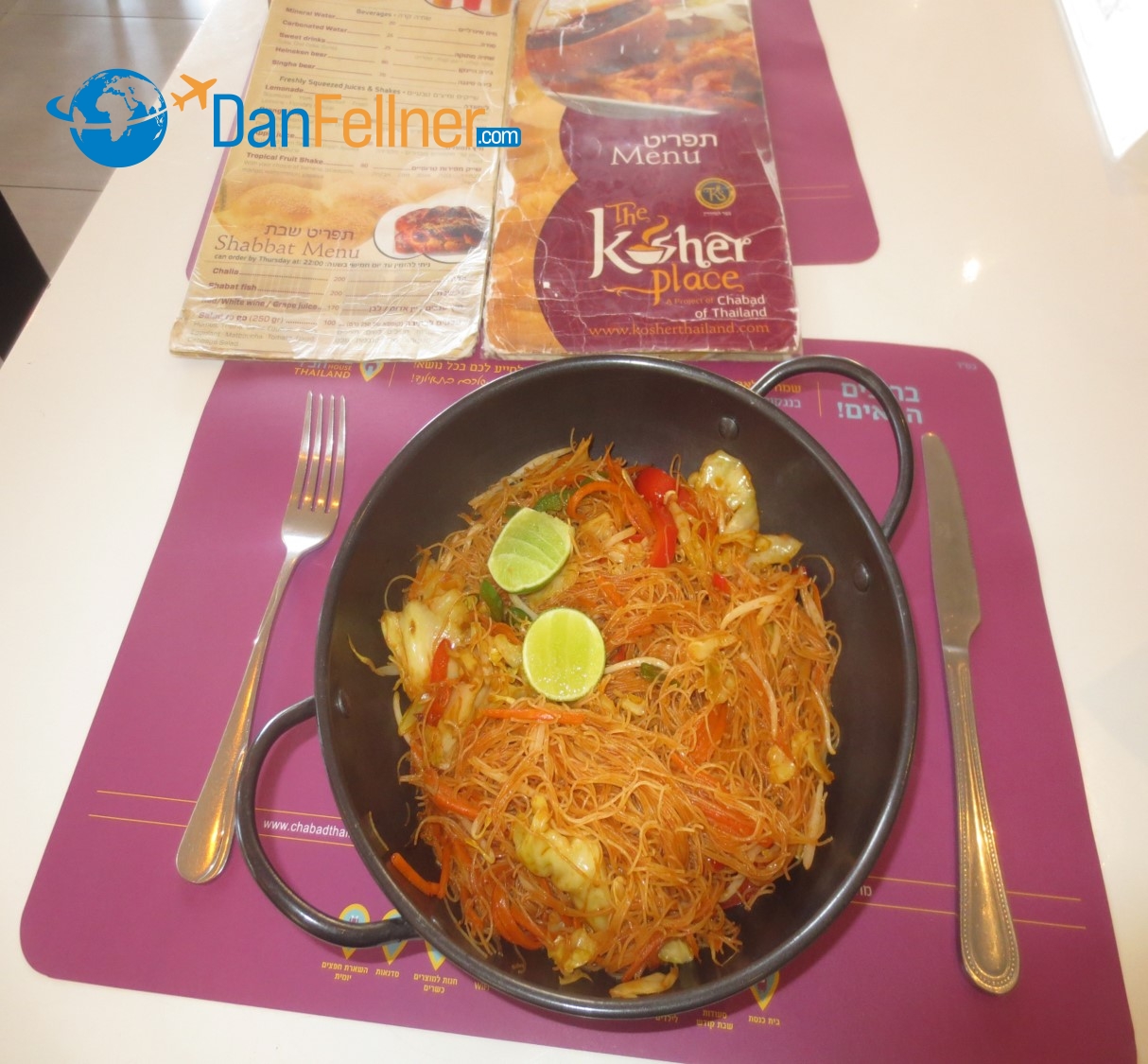
Kosher pad-thai for lunch at the Chabad House restaurant in Phuket.
In Phuket on vacation, I recently wanted to learn about Jewish life on the island and check out the new Chabad campus, now one of the largest facilities of its kind in all of Asia.
I walked 30 minutes from my condo down one of the main thoroughfares in Patong, Phuket’s busy tourist hub known for its white-sand beaches, water sports and bawdy nightlife. I had heard Patong was popular with Israelis but had no idea what awaited me as I got within a few blocks of Chabad.
There were several signs in Hebrew marking Israeli-owned businesses, including travel agencies, restaurants and car/motorbike rental outlets.
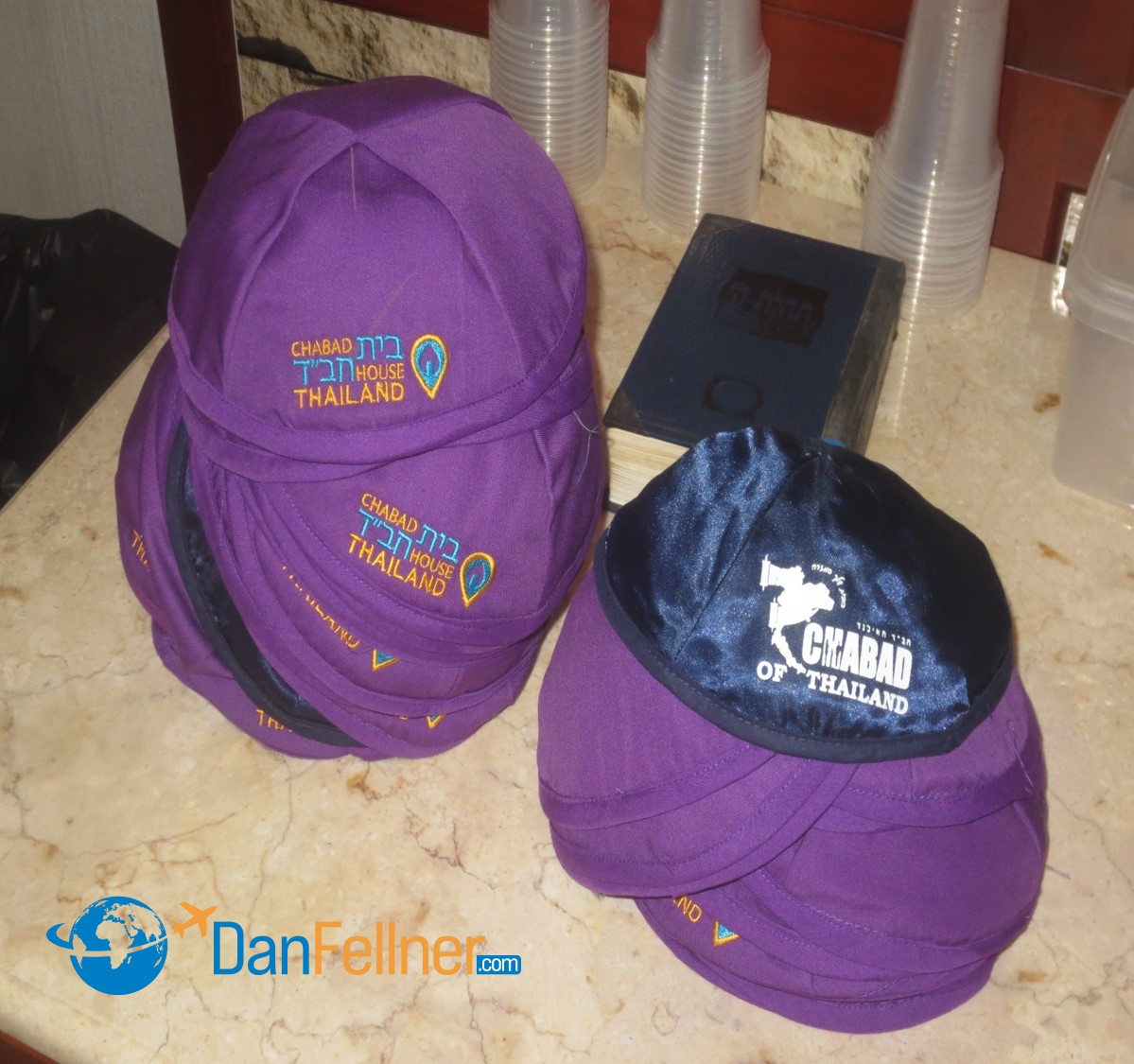
The synagogue inside the Chabad House in Phuket can accommodate up to 300 worshippers.
Miracle of miracles, in this island paradise in the Andaman Sea, I found myself strolling through a Jewish neighborhood.
Just two blocks from the beach, a “Chabad House Thailand” sign directed me down a side-street lined with parked motorbikes to the six-story building called the Dimenstein Family Campus.
But I had made the cardinal sin of forgetting my passport and the guard at the entrance understandably wanted to ascertain that I was telling the truth when I said I was an American Jew and not a potential security threat before letting me inside.
“Can you say the Kiddush?” he asked.
Fortunately, I rose to the occasion.
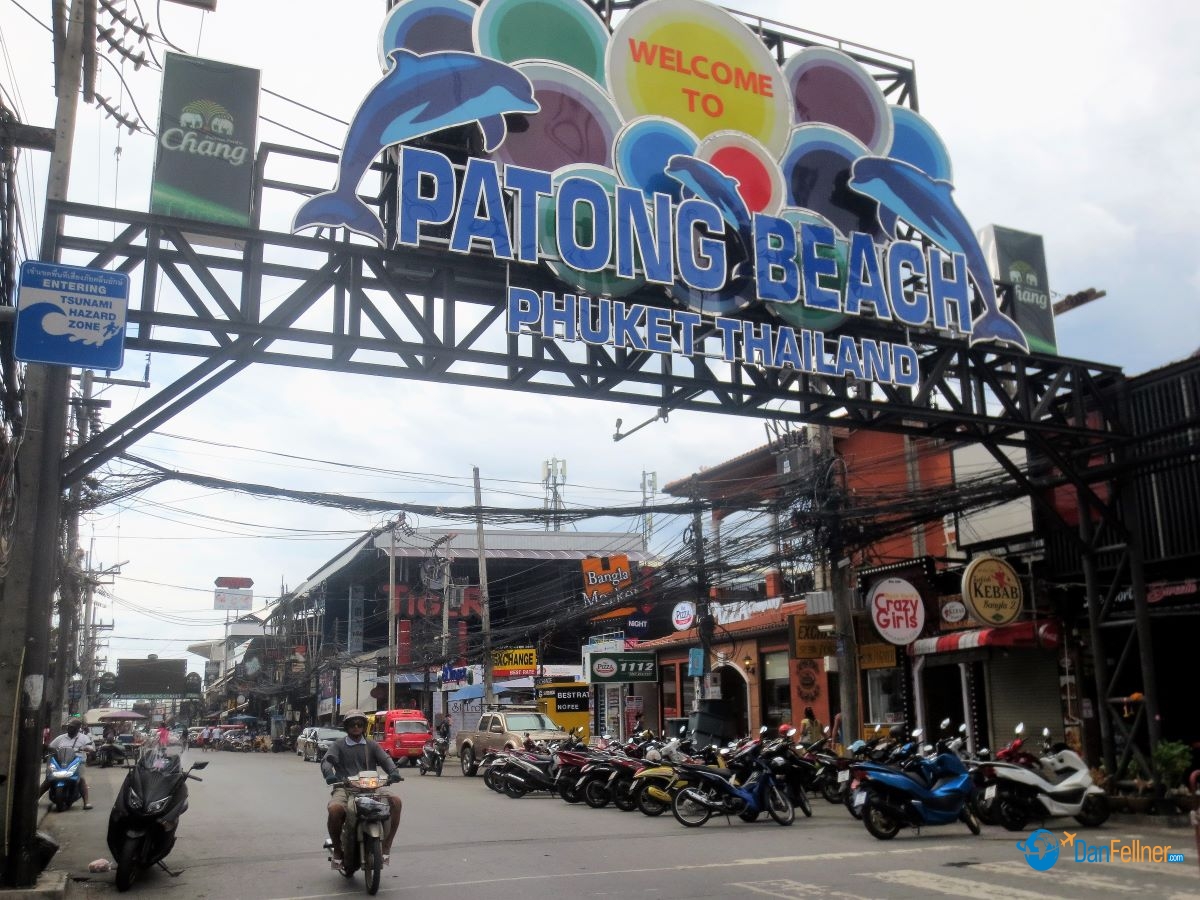
The area near Patong Beach in Phuket is known for its rowdy nightlife.
Although I rarely attend services as an adult, my post bar-mitzvah years as the oldest son reciting the blessing of the wine at our family Shabbat dinners back in Arizona came in handy and I quickly launched into the prayer to prove to the guard that I really was a Jew, albeit a mostly secular one.
He stopped me well before I got to “borei p’ri hagafen,” smiled and nodded for me to go inside.
Upon entering, I was introduced to Rabbi Segal. The 40-year-old Israeli has been leading Chabad’s chapter here for nearly three years, along with his wife and co-director, Miriam (I’m sad to report that Mrs. Segal passed away in 2021 at the age of 38).
Inaugurated this past August – the weekend when the two Israeli Arabs were arrested — the new Chabad Phuket building offers an array of facilities and amenities of which some larger and less transient Jewish communities would be envious.
In addition to a synagogue that can hold up to 300 worshippers, the 26,000-square-foot facility features a mikvah, rabbinical quarters, a social hall that can seat 400 people, and a busy Kosher restaurant that serves everything from hamburgers to Middle Eastern fare to Thai dishes. Kosher meat is imported from Argentina.
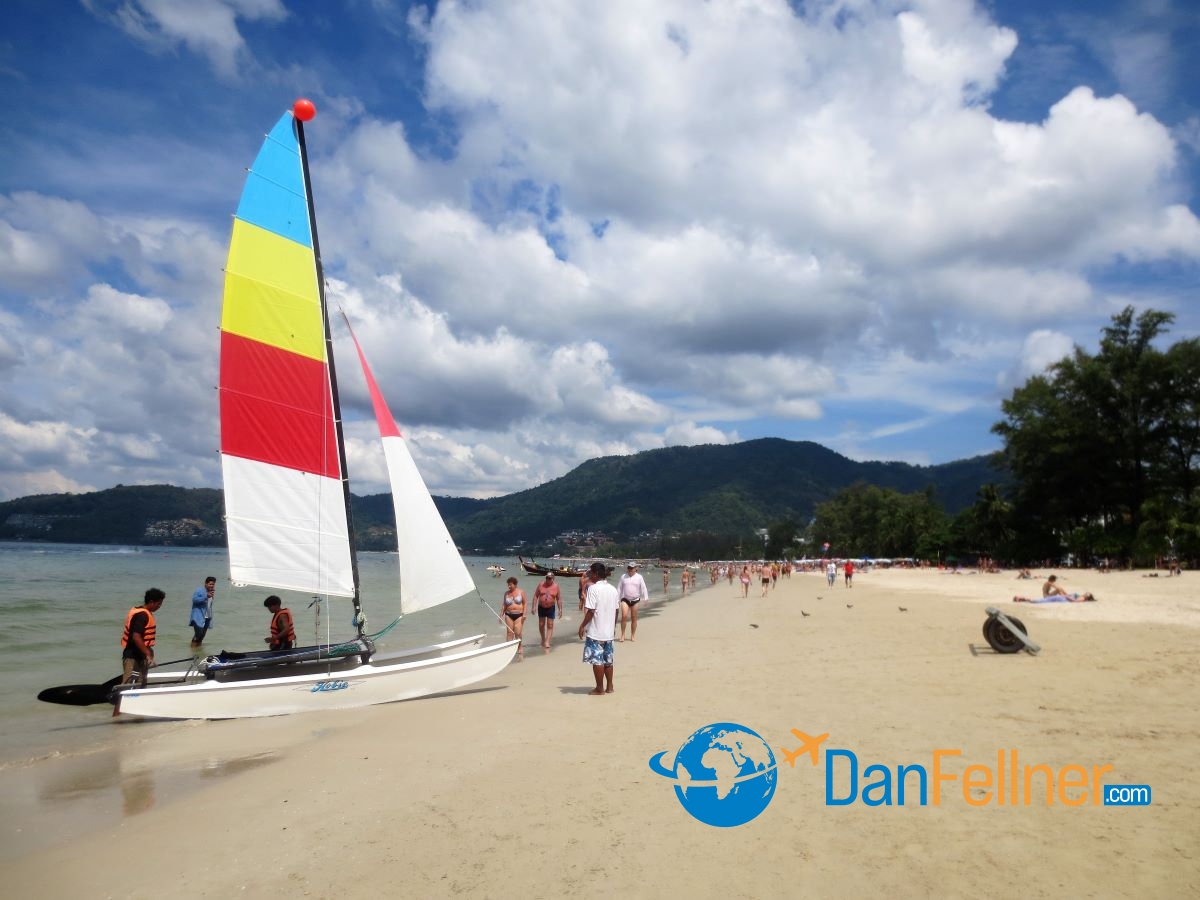
The popular white-sand Patong Beach in Phuket is just a five-minute walk from the Chabad House.
I tried the pad-thai, a local noodle dish that was a bit on the bland side. Rabbi Segal explained that Israelis, who make up about 70 percent of the clientele, tend not to like their food too spicy. And kashrut law puts limitations on the Israeli chef’s use of certain spices.
“Could be the regular pad-thai tastes better, but to make it Kosher, you have to make it in the right way,” says Rabbi Segal.
Phuket is not a large island. The population is less than 400,000 and it’s only about 200 square miles, which makes it less than half the geographic size of my hometown of Phoenix, Arizona.
But more than 5 million tourists visit each year, including a large contingent of Israelis, many of whom fly nonstop from Tel Aviv to Bangkok (Phuket is a 75-minute flight from Bangkok) and spend weeks or even months travelling around the country after completing their military service.
Rabbi Segal says it’s impossible to determine how many Jews live in Phuket year-round, although he guesses that it’s likely only “a few hundred.”
In 2004, Phuket was ravaged by an Indian Ocean earthquake and tsunami. While Indonesia was hit the hardest, Thailand also was in the path of destruction. The tsunami struck the west coast of Phuket, causing about 250 fatalities and extensive damage to the island’s hotels and beaches.

Day cruises on the Andaman Sea near Phuket offer spectacular scenery.
Many tourists, including young Israeli backpackers, were stranded without food, water or shelter. That was the genesis of Chabad Phuket. The group dispatched a group of emissaries that offered assistance.
“They helped not only Jews, but non-Jews” says Rabbi Segal. “They came here to give food, a place to sleep and to help find Jews who had passed away. The tsunami woke people up to let them know that this place needed a branch.”
Chabad quickly outgrew the small building in which it started. In August 2015 ground was broken for the new facility; it opened two years later. About $4 million was needed for construction. Thus far, about $3.25 million has been raised, thanks in part to a generous donation from a Swiss family, the Dimensteins. (To make a donation, visit JewishThailand.com and click on “donate” or email Rabbi Segal at phuket@chabadthailand.com).
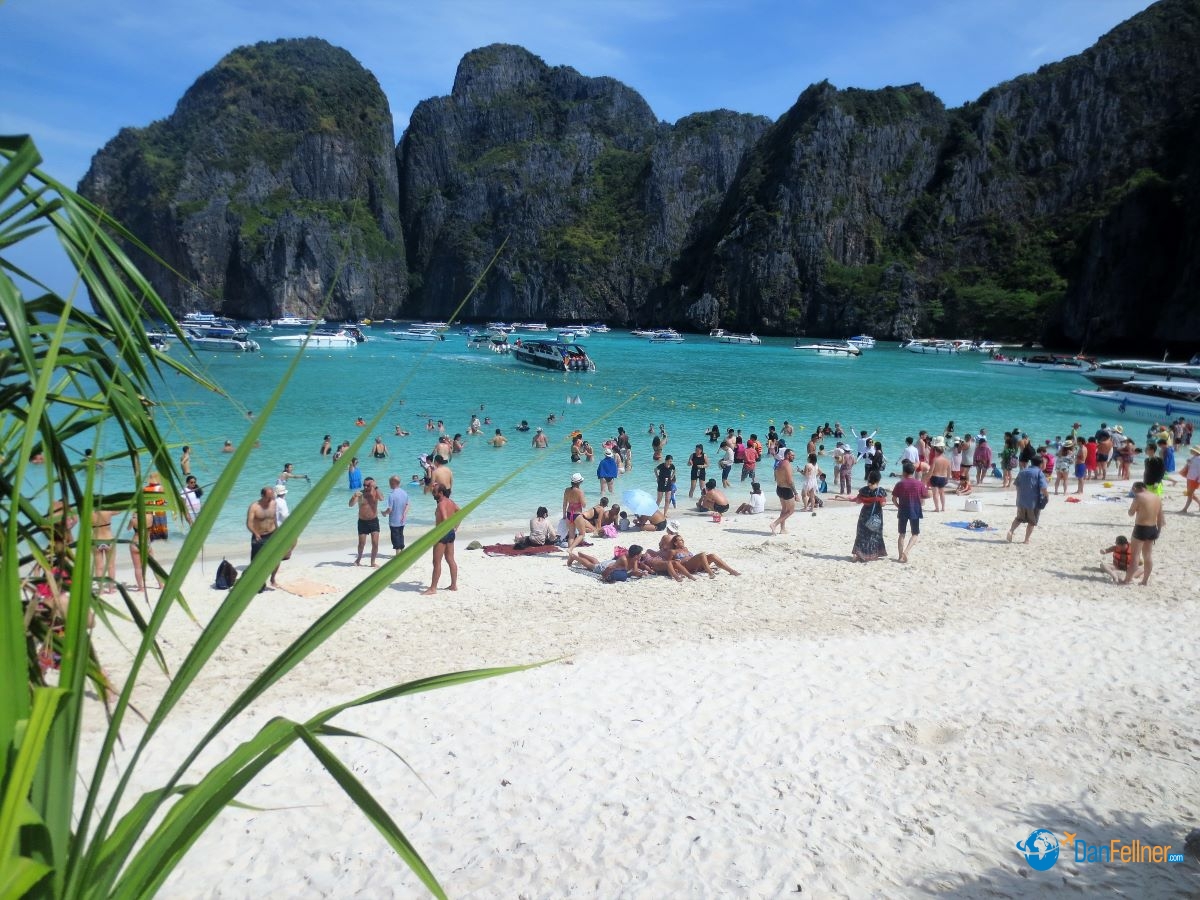
The famous beach at Maya Bay, about 25 miles southeast of Phuket.
When the additional funds are raised, there are plans to install a sukkah and chuppah on the building’s rooftop for weddings and other special events, a venue that would offer spectacular views of the Andaman Sea and surrounding mountains. Rabbi Segal, who works 15-16 hours a day, seven days a week, needs help and plans are underway to add living quarters for rabbinical students from Israel to help carry some of the load.
Already, the new building has brought a 50 percent increase in visitors. During the winter high season, Rabbi Segal says about 500 people typically come for Friday Shabbat dinner. Two seatings are needed to accommodate everyone. About 700 worshippers attended Rosh Hashanah services last September.
What’s it like to be a rabbi in an island paradise? Rabbi Segal says the demands of the job give him virtually no time to enjoy the weather, scenery and attractions that bring so many tourists to Phuket.
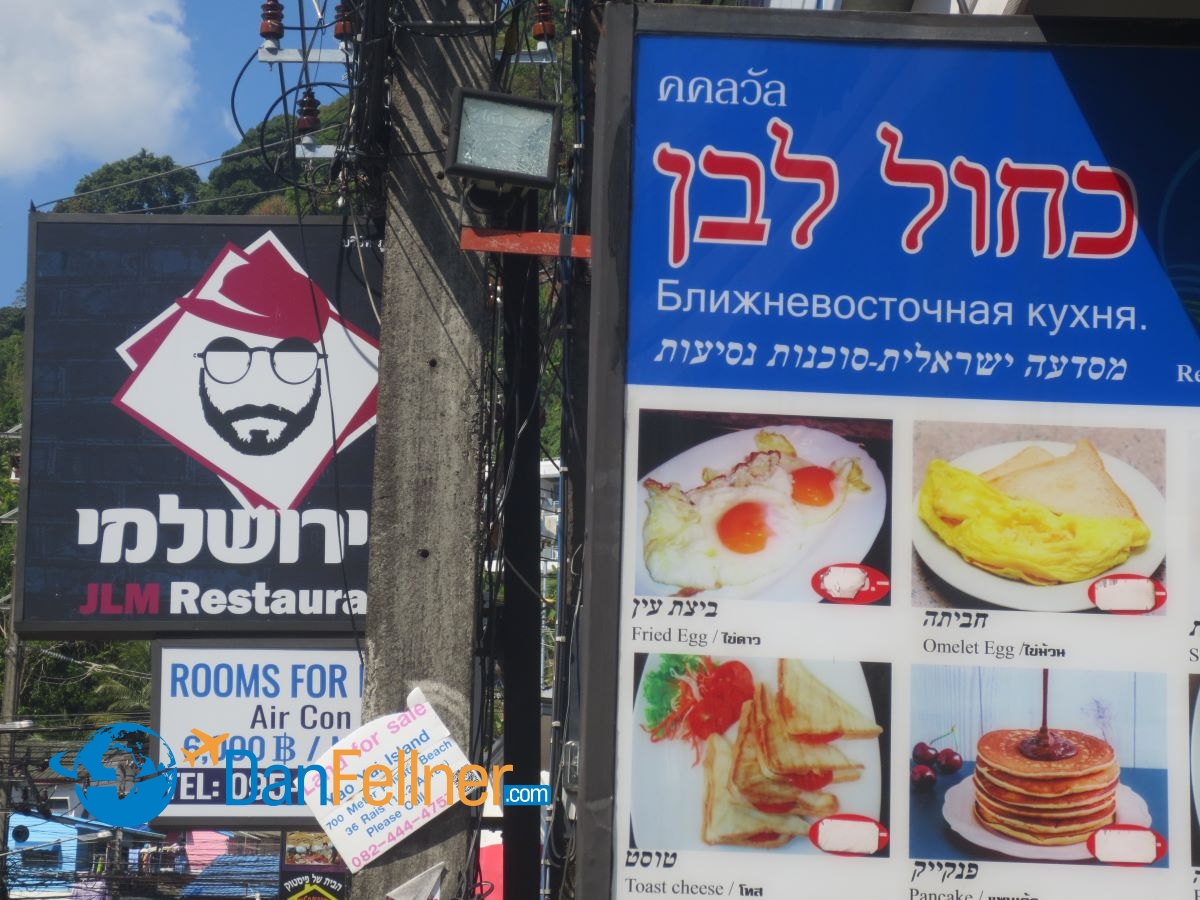
Jewish-owned restaurants in downtown Patong, Phuket.
“When you’re in Chabad, you’re on a mission,” he says. “You’re not here to enjoy the beaches because the job is inside the Chabad House. This place is open from the morning to the night and we’re here all day, so we don’t have the time to go out and enjoy it. The rabbis of Chabad don’t really get to enjoy the beauty of the places they stay.”
When the rabbi does get out into the community, he has found the Thai people warm and welcoming of Jews, with no hints of anti-Semitism.
“We respect them. They respect us,” he says. “It’s something you don’t see in different places in the world. They are really nice people.”
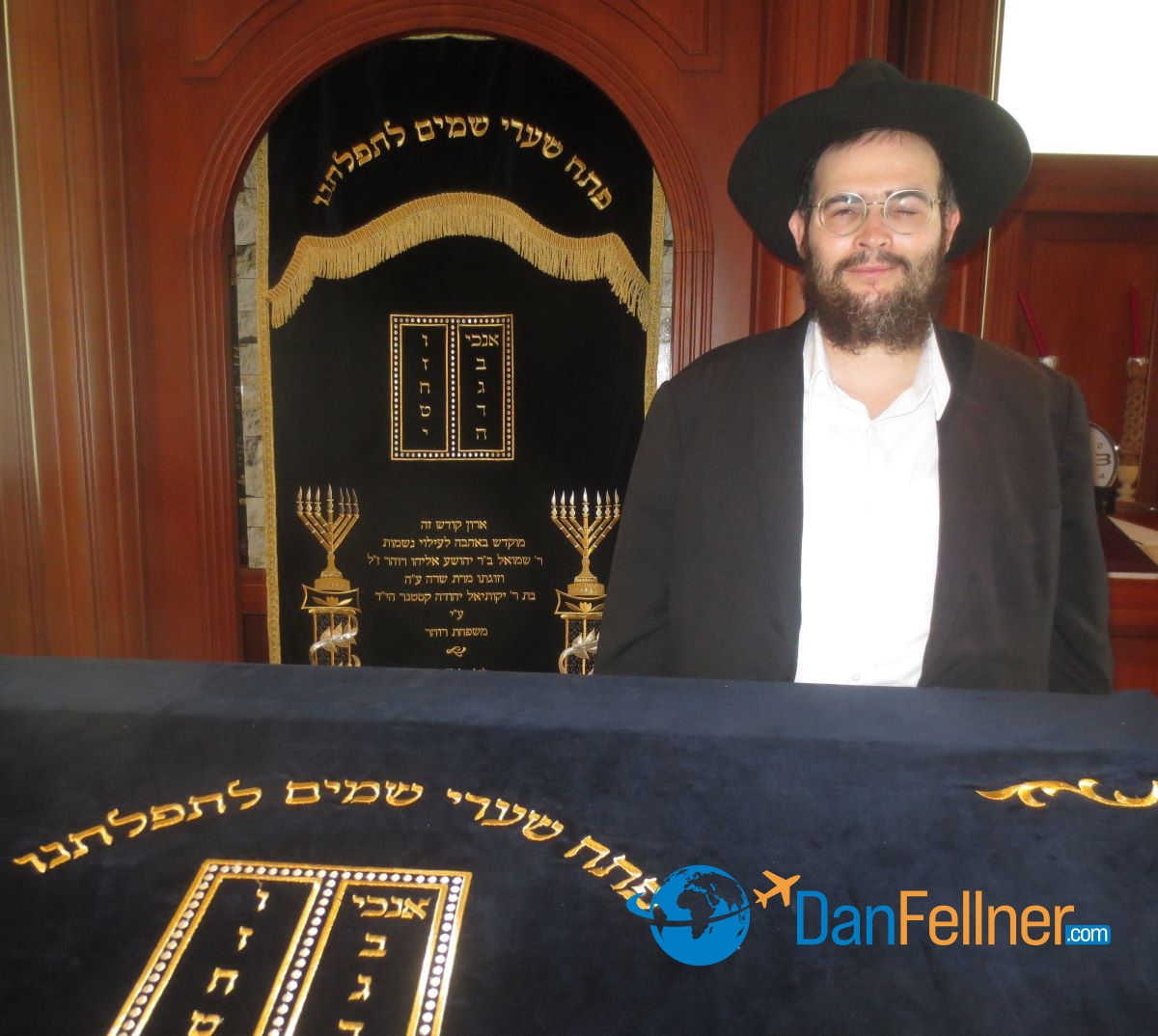
Rabbi Mendy Segal inside the Chabad Phuket House sanctuary.
Even though I’m not particularly religious, whenever I travel, I make an effort to connect with the Jewish community – no matter how large or small. It greatly lessens the culture-shock of visiting places so far from home. There is a sense of comfort derived from being with other Jews, even if our religious views might be widely divergent.
While I don’t keep Kosher or wear a kippah outside of synagogue, I’m always looking for ways to intertwine my sense of Jewish identity with my travels.
When I told Rabbi Segal that my visit to the Phuket Chabad Center happened to coincide with my deceased father’s 94th birthday, he was kind enough to recite the Kel Maleh Rachamim, a remembrance prayer for the soul of the departed. After reading the prayer in Hebrew, he took the time to explain the meaning behind it in terms I could understand.
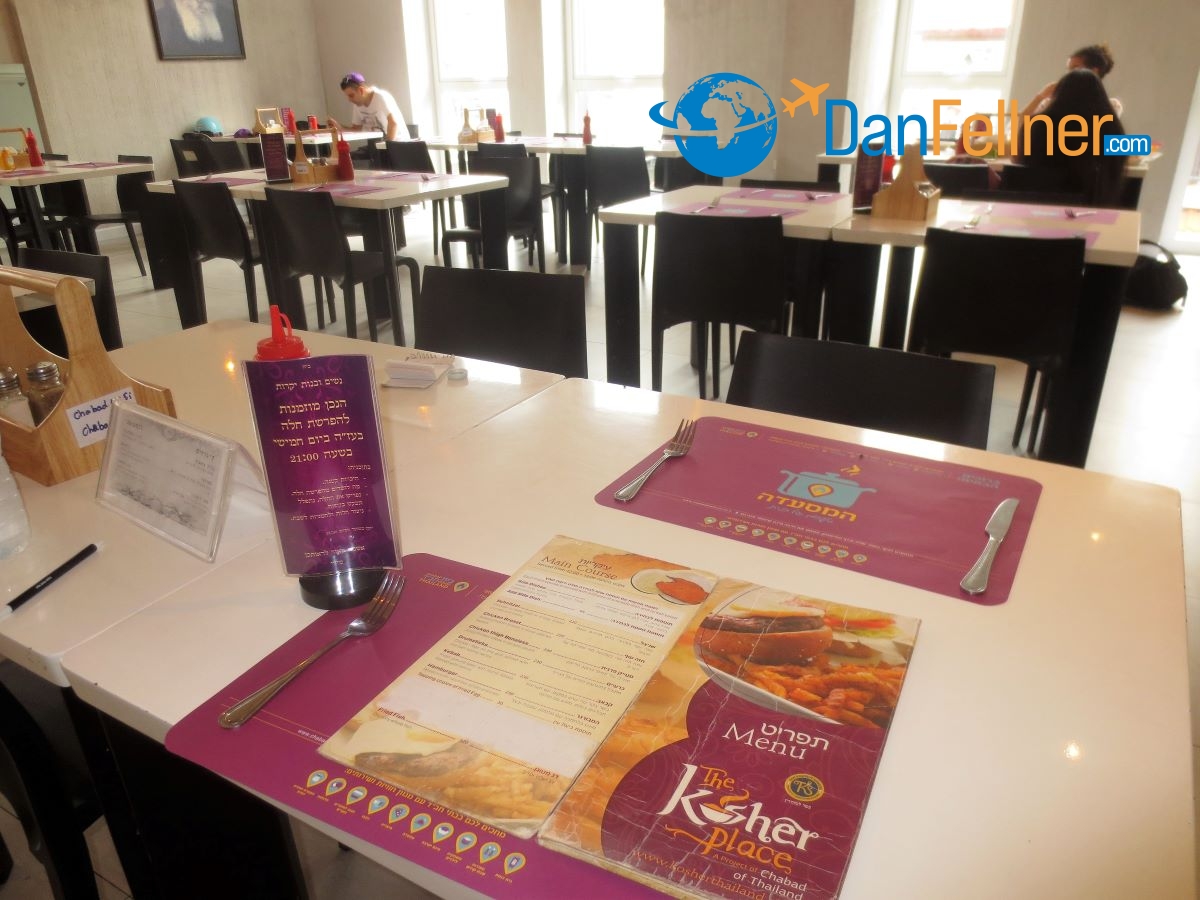
Inside the Chabad Phuket kosher restaurant.
Chabad now has about 3,500 chapters in more than 85 countries. The Hasidic group, which I’ve grown to appreciate over the years for its hospitality and acceptance of non-religious Jewish travelers like myself, has a presence in four different Thai locations – Bangkok, Chiang Mai, Koh Samui and Phuket.
All offer an oasis of Jewish values and relative tranquility in a country with a reputation for being one of Asia’s most boisterous party spots.
There is an old Hasidic saying: “Every descent is for the sake of a future ascent.”
Such is the case with Chabad Phuket. It was born 14 years ago following a deadly tsunami. It has now ascended to heights even few shluchim would have imagined possible.
__________________________
Editor’s postscript: On one of my final Friday evenings in Phuket, I accepted Rabbi Segal’s invitation to attend Shabbat services. The synagogue was packed; men and women were segregated by a wall. It was a very different service than what I’ve experienced in the past.
Afterward, I sat down to Shabbat dinner with about 500 people (there had to be two seatings as the social hall only has space for 400). The food was traditional Jewish fare — salads, fish and chicken — and plentiful. In between courses, there was a lot of clapping, singing, dancing and praying. Some people even stood on their chairs.
Rabbi Segal couldn’t have been more gracious. He made sure I had an English prayer book during the service and sat me next to a fellow American at dinner so I’d have someone with whom to converse. I emailed him a thank you note a couple of days letter.
His reply summed up Chabad’s overriding mission: “Thank you very much for coming,” he wrote. “It is our pleasure to make another Jew happy.”

© 2018 Dan Fellner



